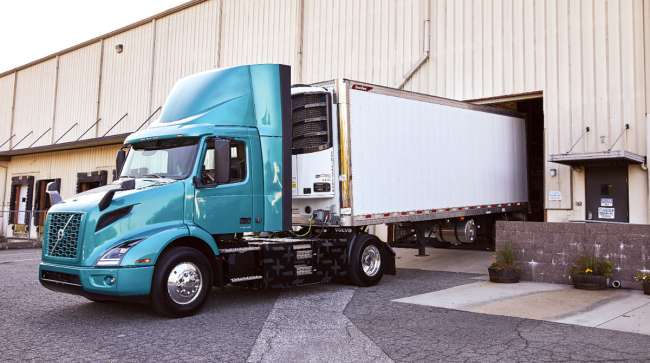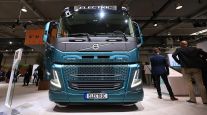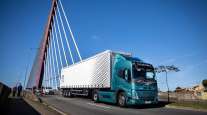Senior Reporter
Volvo Group Earnings Rise on Global Vehicle Sales

[Stay on top of transportation news: Get TTNews in your inbox.]
Volvo Group reported strong second-quarter earnings and revenue as sales in its global vehicle-related segment rose 41% compared with a year earlier.
For the period ended June 30, Volvo, which reports in Swedish krona, had net income that was the approximate equivalent of $1 billion, or 50 cents per share. That compared with $5 million, and a loss of 0.02 cents per share, a year earlier, the company reported July 20.
Revenue increased to $10.4 billion compared with $8.4 billion in the 2020 period.
Global vehicle sales, its largest segment, rose to 69,122 units compared with 48,959 — including sales of construction equipment and its Penta engines and excluding sales of UD Trucks, a company Volvo divested in April.
“Overall, freight markets have continued to be strong and our customers’ utilization of their trucks high, which were reflected in a strong service business and continued good order intake,” Volvo CEO Martin Lundstedt said in the earnings release.
At the same time, the global supply chain for semiconductors and other components, he said, “remains unstable with low visibility. There will be further disruptions and stoppages in both the truck production and other parts of the company in the second half of the year.”
In the quarter, North American truck orders rose 85% to 7,740 compared with 4,176 a year earlier.
Through May, Volvo Trucks North America notched a 0.6 percentage point increase in market share to 9.7%. Mack Trucks saw its share dip 0.2 percentage points to 7.1% — the two are the Gothenburg, Sweden-based company’s U.S. truck brands.
Globally, the company delivered “close to 46,000 trucks despite the disturbances in the supply chain, which forced us to temporarily halt truck production corresponding to close to a month,” Lundstedt said. North American deliveries jumped 151% to 9,858 compared with 3,925 in the 2020 period.
Lundstedt said interest in its electric trucks for city distribution and refuse collection, largely in Europe, gained momentum in the quarter, with 98 electric trucks delivered and another 194 ordered.

Lundstedt
“The electrification of the transport and infrastructure industries are key components in the transition to a more sustainable society, providing us great opportunities,” he said.
Meanwhile, its financial services unit increased new business volume and improved penetration, according to the company.
Operating income jumped to $105 million compared with $1.3 million a year earlier.
The company noted the improvement in operating income was primarily a result of lower credit provisions compared with the 2020 period when credit reserves increased “with expectations of higher write offs due to the pandemic.”
The number of overall units financed increased to 67,108 compared with 60,688 in the 2020 period.
Highlights in the quarter included: 50-50 joint venture Cellcentric with Germany’s Daimler Truck AG called to manufacture hydrogen fuel cells for trucks in Europe starting in 2025 and lobby European Union policymakers to boost incentives for climate-neutral technologies.
In related news, striking United Auto Workers at Volvo Trucks North America’s truck assembly plant in Dublin, Va., in a tight vote, ratified a new six-year contract, both parties announced July 14. Volvo intends to use that plant to assemble its electric heavy-duty trucks.
Also in July, Volvo, Daimler Truck and Traton Group (the parent company of Navistar Inc. and its International truck brand) announced plans to install and operate a public electric vehicle charging network for longhaul trucks of all brands and motor coaches across Europe.
The move is intended to jump-start the needed infrastructure and enhance customer confidence as Europe moves toward climate-neutral transportation by 2050, according to the truck makers.
Meanwhile, in the United States — where Class 8 brands from the three European-based truck makers account for about 65% of U.S. retail sales in the heavy-duty segment, according to WardsAuto.com — electric trucks are starting to emerge from their developmental cocoons.
Want more news? Listen to today's daily briefing below or go here for more info:





